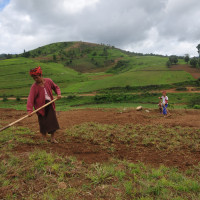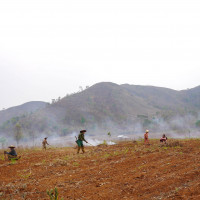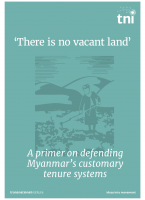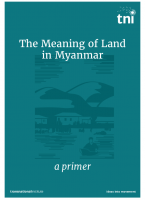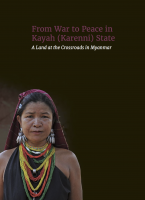“First they grabbed our land with guns; now they are using the law" A Commentary by TNI on the Right to Land of People Displaced by War and Militarization
Fecha de publicación:
Displaced people in Myanmar have been suffering layer upon layer of injustice over the past decades. Today the situation is as bad as ever.
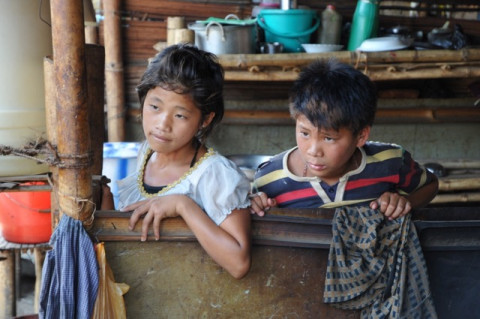
Tom Kramer
“In Myanmar, people are suffering from the fighting, while the government is also trying to manipulate and divide the displaced people. Some people go back, some remain in the IDP camps. It’s like a hell in the country.” (Internally Displaced Person (IDP) meeting, 13 August 2019, Myitkyina)
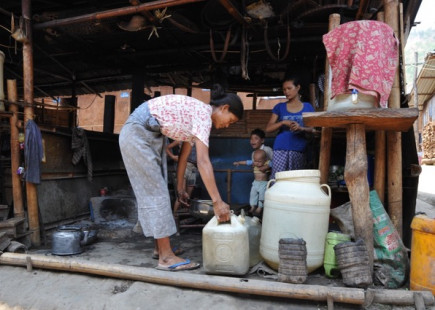
Tom Kramer
This is how one IDP, displaced since 2011, recently described the current situation in the north of the country. In both the north and the east of Myanmar, displaced people have been suffering layer upon layer of injustice over the past decades. Today the situation is as bad as ever. Ongoing conflict, militarization and business-oriented mega-projects continue to drive fresh displacements, while keeping those displaced previously from returning to their homes, farms, forests and villages.
Since 2010, a raft of national laws and policies has been enacted regarding land, forests, conservation and investment. They do not, however, reflect the needs or the rights of people who have been displaced. There is currently no law that properly addresses the terrible situation confronting displaced people by recognising the right of IDPs and refugees to restitution based on their right to land. Instead, current government policy seems to be encouraging re-allocation of the lands of IDPs and refugees to business interests. Key areas include agriculture, mining, industry, infrastructure and even ecotourism, whether in the pristine islands in the far south or the majestic mountains in the far north.
In particular, the 2012 Vacant, Fallow and Virgin (VFV) Land Management Law – and its 2018 Amendment – pose a major threat to IDP-refugee lands and to the moral obligation to guarantee and ensure the right to return and restitution of displaced people,1 and to peace.2 The VFV law and its amendment are currently being used by unscrupulous individuals and business actors to claim and register IDP and refugee lands. The failure of the government and other key actors to put displaced people first has led to lengthy displacements, an additional trauma on top of the original trauma caused by conflict and loss of homes and livelihood.
Meanwhile the nationwide peace process, which has never really picked up momentum under the National League for Democracy (NLD) government, is now badly faltering. Fighting and militarized conditions continue in many parts of the north and the east as well as Rakhine State in the west. Intense skirmishes continue to regularly erupt. People living across the border in refugee camps, particularly in Thailand, are increasingly under pressure from authorities on both sides to return to Myanmar regardless of the many risks, while the international community is reducing humanitarian support to the population in these camps. At the same time, the Myanmar government is planning to close down IDP camps across the country, including in areas still affected by armed conflict and militarization. It is no wonder that displaced people liken parts of Myanmar at present to a kind of hell on Earth.
IDPs and refugees uniting around their right to land
Amidst growing pressures on local communities and their lands, the Border Consortium and Transnational Institute have been helping displaced people (mainly IDPs and refugees from armed conflict) and the frontline organisations that support them to come together to build advocacy to defend and claim their right to land. Since 2016 several joint meetings have been organised, in Yangon and in Myitkyina, bringing together IDPs and refugees from five nationality states – Kachin, Shan, Kayah (Karenni), Karen and Mon – to share their experiences and aspirations, to analyse these according to human rights principles, conventions and agreements, and to build a joint position on their right to land.3
Now, the new land law amendments, especially VFV, and government plans to close all IDP camps in the country are really compelling people to try to speak louder to gain recognition and defend their rights. Displaced people – both IDPs and refugees – are realizing that they have no choice but to face up to the situation. Many increasingly are turning to their own resources and to each other to find common ground in their experiences and work together to build a united front and undertake advocacy in partnership.
Recently, displaced people from the five states decided to make a joint position paper and launch it at a public event in Yangon. The group held separate briefings with the LIFT Fund Board and with the United Nationalities Alliance (UNA) of political parties before holding a public event to introduce their joint position paper. At each event, a panel of speakers shared the trauma of displacement and the struggle for peace, recognition and justice, with five different people speaking each time from the five different areas.
More than 130 people attended the public event at the Summit Park View Hotel in Yangon, coming from various embassies, UN agencies, international non-governmental organisations, political parties, civil society groups and the media. This public event demonstrated the extraordinary situation of displaced people: ordinary people who have been victimized by war and land-grabbing, trying to make good from destitute situations that are not of their own making but which they find themselves in nonetheless.
During the briefings the delegation told how, after they had been displaced by fighting, their lands were taken over either by the armed forces for encampments or by government authorities who reallocated their lands to companies for so-called “investment” or “development” projects. This was the pattern across all five states, whether the displacement occurred long ago or more recently.
Replying to questions about what they want, the delegates were clear in stating that the lands from which they were displaced should be returned to them, but that there should be no return until their safety and security are guaranteed and their land and livelihoods can be restored. They also said that the VFV Law should be abolished; that their customary rights of ownership should be recognised; and that land should be recognised as owned by the people who live and work on the land.
To ensure this, they said that a new law should be developed through an inclusive, bottom-up process that truly involves IDPs and refugees and recognises their right to land. This new law also needs to recognise that ethnic nationality peoples have long had their own customary systems of land ownership and management. The land law in Myanmar should therefore aspire to serve the poor and obtain the consent of all the people – not just the handful whose business interests are currently being served.
Quotes from the IDP-refugee briefings:
“Some IDPs are recent, others are from a long time ago. It started in 1974 with the Myanmar Army “Four Cuts” Strategy. Maybe people in the city do not know about this, but we will never forget. Since 1984 there are refugee camps in Thailand.” (Karen refugee, 21 August 2019)
“In 2012 the VFV law was adopted. We are very worried about that. In our village of origin many businessmen have registered our land. We have no legal documents; we have our customary system. The government keeps saying it is a black area, and they refuse to come and demarcate our land, so we cannot get Form 7. They ask us to protect them if they would come and visit, but who should protect who?” (Kachin IDP from northern Shan State, 21 August 2019)
“After the VFV law amendment, over 50 acres of land in Pruso were registered under the name of a Burma Army commander. These laws should be for the people, but now they benefit only a small group of people.” (Karenni IDP-refugee right to land defender, 21 August 2019)
‘’The main issue we now face is our land. Tissue banana plantations are threatening our land and our village. The Forest Department now designated our land as forest-land. These signboards only appeared after the banana companies came in; before that we had never seen them. The government also is very active with the VFV Law and is conducting a land survey. We have already lost our human rights and are living in displacement. Now we are facing additional problems with our land.” (Kachin IDP from Kachin State)
“Land is important to secure our life and to feed ourselves. The Mon region has no active fighting but many landgrabbing issues and impacts from the VFV law. We have no VFV land in Mon area, but the government keeps on enforcing this law on us. Many government projects are planned in the villages of origin of Mon IDPs. Our key demand is that we cannot accept this VFV law. We do not have VFV land in our area.” (Mon IDP-refugee right to land defender, 21 August 2019)
“In 2012 the government and the Karen National Union signed a ceasefire. From that time many international organisations said that it is already peaceful so IDPs and refugees can go home. There are many pressures on us to go back, and support to refugees is reducing. If we decided to go back: where to live? There are secondary occupants and Burma Army outposts. The government housing for returnees is too small and no land and no economic opportunities. If IDPs and refugees return, the Burma army should withdraw their outposts, landmines should be cleared and livelihoods provided.” (Karen IDP, 21 August 2019)
“The authorities want us to go back. The Myanmar army outposts are still in our village. Who will guarantee fighting will not break out again? There is no durable solution yet reached in political dialogue.” (Kachin IDP, 21 August 2019)
Canary in the coal mine
One of the key demands of the IDP-refugee delegation is the following:
“All authorities (Government and EAOs) should prioritize the restitution of IDPs’ and Refugees’ displaced lands in their villages of origin and take any and all necessary steps to ensure their safe, dignified and voluntary return and meaningful restitution, including access to decent and sustainable livelihoods and the basic physical, social and economic conditions necessary for them to reconstruct dignified lives in peace and in safety.”
Almost certainly anyone in the country (or indeed in the world), who finds themselves trapped in the same situation, would make this very same demand and would be motivated by the same desire for real peace with justice and democracy from which their demand springs.
It is possible that both government and business actors have been hoping that, over time, the IDPs and refugees in Myanmar will just disappear. But this is manifestly not happening. Instead, those displaced from their lands are becoming better organised and clearer and stronger in their advocacy. All they have ever wanted is to be fully and meaningfully recognised as having the right to fundamental human rights, including the right to land through restorative justice. IDPs and refugees should not be written off as unfortunate people who just happen to be on the wrong side of history and whose day will never come. On the contrary: they are the canaries in the coal mine – what happens to them is a signal to the rest of society of what possible fate lies ahead for all. If human rights cannot be guaranteed for the most marginalized and impoverished in society, it is a terrible indictment on the direction of political change in the country.
Download and read the position paper of the IDP-refugee delegation here (English) or here (Burmese).
Endnotes
